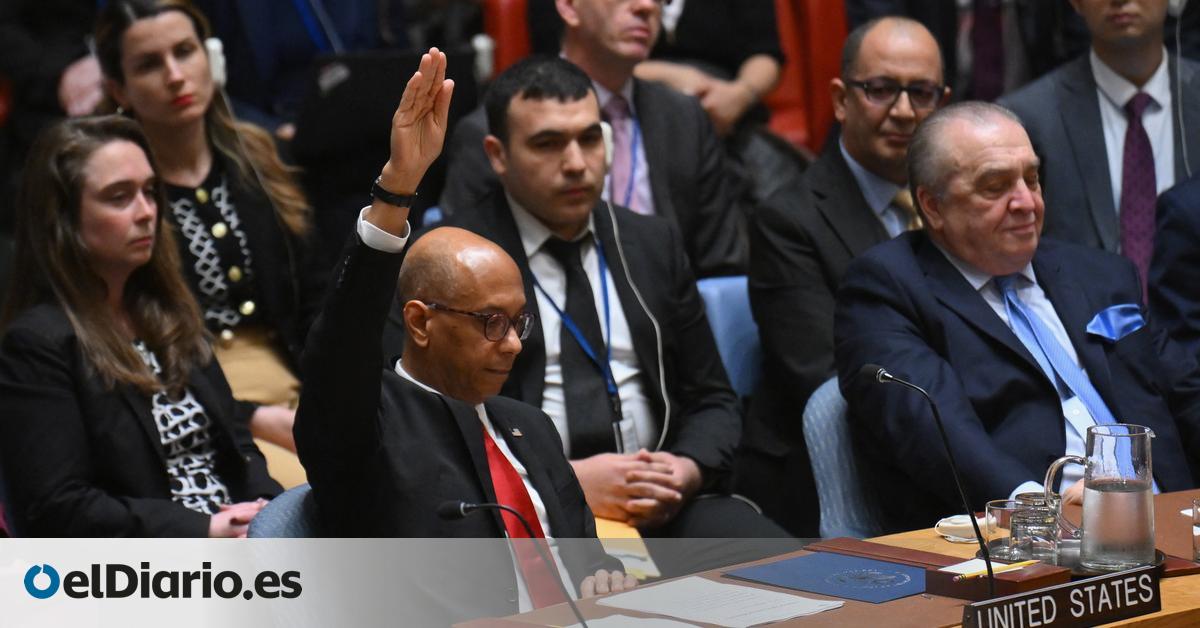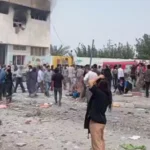
The United States has again looked out for Israel’s interests and opposed Palestine becoming a full member of the UN. Washington has fulfilled its promise to exercise the right to vote in the Security Council, which State Department spokesman Vedant Patel had already announced hours before.
In favor of the resolution presented by Algeria to admit Palestine to the UN – it is now an observer member – and the request of the permanent observer of Palestine to Guterres to reconsider the membership application already presented in 2011, 12 members have voted. There have only been two abstentions and the United States has voted against. Washington’s vote against it renders the proposal null and void.
As if the veto were not enough, Washington has also threatened to “withdraw” North American funding from the UN if it were to allow full accession of Palestine. The United States is currently the country that contributes the most to the UN: last year alone it gave more than 18 billion dollars, according to Efe.
Before the debate on the Palestinian question ended this Thursday in the Security Council, and before all countries expressed their position on the situation in Palestine following a resolution presented by Algeria, Washington has already announced that it planned to exercise its right to veto. Even before it was known whether the Palestinians have the votes of at least 9 of the 15 members of the Security Council – they have achieved 12 in the end. This is the minimum figure so that the recommendation of the Security Council can be carried out so that the incorporation of a new member state can then be voted on in the General Assembly. Specifically, it is necessary for it to obtain the support of two-thirds of the General Assembly.
The announcement of the North American veto was made known shortly after the United States ambassador, Robert A. Wood, finished his speech. In fact, when he has had his turn to speak he has almost not mentioned the Palestinian issue. He has dedicated most of his time to condemning the attacks, the Iranian attacks last Saturday, and reaffirming the “ironclad” support of the Americans in the defense of Israel. Once again, he has also pointed out Hamas as the “sole” responsible for the fact that there is still no ceasefire in Gaza. “If Hamas had accepted Israel’s offers [en las negociaciones para liberar los rehenes israelís] A ceasefire would have already been accepted. “Hamas is the only obstacle to the ceasefire in Gaza,” he stated.
The only veiled reference that there has been to the question of the Palestinian State has been when he said that they will continue “with direct diplomacy so that Israel maintains negotiations with its neighbors. We have to achieve credible measures for the creation of the two states.” Woods has not even responded to the question raised by the special representative of Palestine, Ziad Abu Amr, who reminded him that when Israel was recognized as a member state of the UN, no negotiations were required: “How was the state of Israel created? ? Wasn’t it through a UN resolution, 181?”
Likewise, Abu Amr has claimed that the region “will not enjoy stability without the establishment of an independent Palestinian state with the 1967 borders and with East Jerusalem as its capital.” At the other extreme, the Israeli ambassador, Gilad Erdan, dedicated himself to warming up the atmosphere of the session and assured that “there is no greater reward for terrorism than today’s meeting.”
At the beginning of the debate, the Secretary General of the UN, António Guterres, underlined “the responsibility and moral obligation” of the international community to make the Palestinian state viable. Guterres has stressed that recognizing the state of Palestine will be a way to reduce tension in the region, which he has once again recalled is “on the brink of the abyss” after Iran’s attack against Israel. Guterres’ support for Palestine to become the 194th member state of the United Nations has only symbolic value, since he has no powers to intervene in the admission process.
The Palestinians are currently a non-member observer state, a de facto recognition of their statehood that was granted by the UN General Assembly in 2012. If Palestine is admitted it would be a historic diplomatic victory.
In 2011, a Security Council committee evaluated the Palestinian request for several weeks, but did not reach a unanimous position and the Council never voted on a resolution to recommend Palestinian membership, Reuters reports. Diplomats then stated that the Palestinians did not have sufficient support for approval and Washington had expressed its opposition to the measure.
The debate to recognize Palestine as a UN member state comes six months after Israel’s war in Gaza began more than six months ago and has already left more than 34,000 Palestinians dead in the Israeli offensive. During this time, Israel has also expanded occupied areas in the West Bank.
Spain asks for immediate recognition
The Minister of Foreign Affairs, José Manuel Albares, has announced before the UN Security Council that “Spain is going to recognize the Palestinian State because the Palestinian people cannot be condemned to being a people of refugees.” Thus, the minister stressed that to “guarantee” peace in the region “there is only one way to achieve it.” And he recalled that 76 years ago, the first UN peacekeeping mission was in Palestine. “How much longer should we wait to solve it?” Albares insisted before the members of the Council.
Albares has argued that Palestine has “the right to a future with hope just as the Israeli people have the right to a future of peace and security.” In this way, he has linked the security of Tel Aviv and the peace of the region with the existence of a Palestinian state. “They both have the right to it, the same right,” he assured, demanding the two-state solution. Given the escalation of tension in the Middle East after Iran’s attack against Israel last Saturday, the Spanish representative has asked that “the spiral of violence must stop.”
Source: www.eldiario.es

